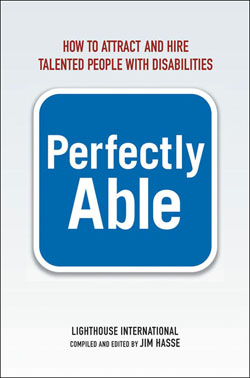Editorial
Front Page - Friday, November 12, 2010
The Bookworm
“Perfectly Able”
Terri Schlichenmeyer

You’ve got an opening at work, but you’re having a hard time filling it.
Obviously, you want the most talented people to work for you. You’ll do what it takes to hire them. So why can’t you find the right person for this job?
Could be, says compiler and editor Jim Hasse, that you’re not looking in the right places. In the new book “Perfectly Able” with Lighthouse International, he presents an under-utilized segment of talent.
According to a recent poll, more than 40 percent of self-employed people with disabilities said they started their own business because they “needed to create their own job.” That includes aging Baby Boomers delaying retirement (a population whose number increases daily) and disabled veterans. Overall, about 13 percent of the labor market consists of disabled workers.
While it doesn’t take much of a leap to understand that that kind of talent and experience shouldn’t be ignored, many employers don’t know how to tap into it and misconceptions are rampant.
The starting place, says Hasse, is internal. Create disability awareness and diversity initiative in your workplace. Hire a diversity coach and be proactive with your staff and your hiring practices. Understand that, with today’s technology, disability is “irrelevant” and that no one can work without help. Appoint an office mentor, and create a welcoming, inclusive work environment.
While there are places in which you can advertise job availabilities specifically for disabled employees, you should also make clear to temp services and headhunters that you expect them to send you disabled candidates as a matter of course. Throughout the hiring process, don’t be nervous or hesitant but be aware of legalities, questions you can ask and issues you can broach. Never assume anything, and understand that hiring is about what a worker can do, not what they can’t do.
And what does an employer get out of this? Disabled people, Hasse points out, are already used to problem-solving and adapting. Absenteeism, tardiness, and turnover rates drop when a business hires disabled workers. And if an employee is returning to a job after becoming disabled, the return generally has a positive effect on morale.
“Perfectly Able” is a bit of a conundrum, both good and bad.
As I was reading this book, I couldn’t think of one single hire-someone-with-disabilities issue that wasn’t covered. Even the things I didn’t think of are here, which makes this an excellent resource for any employer who plans on hiring in the ‘New Reality.’ Editor and compiler Hasse also included Web sites that you and your HR can use to get the newest possible information.
Conversely, though, there’s some confusion inside. Advice is often conflicting (to single out or not to single out, that is the question) and – considering that this book is meant for employers – there’s an awful lot of needless (for this purpose) advice for disabled workers who are looking for jobs.
Still, despite the bumps, I think this is an important book with information that no businessperson can afford to ignore. For you, “Perfectly Able” will open valuable avenues.
The Bookworm is Terri Schli-chenmeyer. Terri has been reading since she was three years old and she never goes anywhere without a book. She lives on a hill in Wisconsin with two dogs and 12,000 books.
|
|